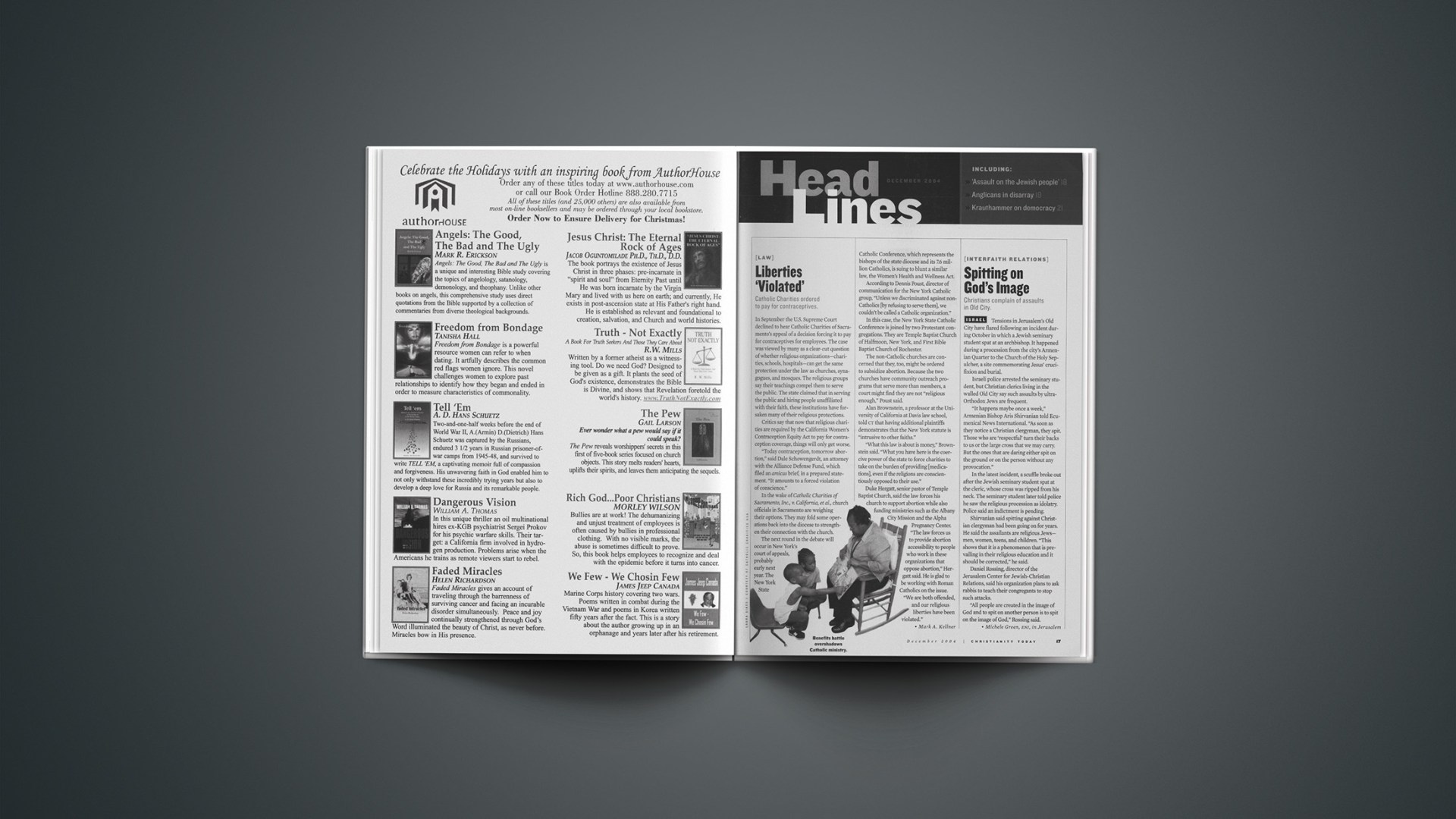In September the U.S. Supreme Court declined to hear Catholic Charities of Sacramento’s appeal of a decision forcing it to pay for contraceptives for employees. The case was viewed by many as a clear-cut question of whether religious organizations—charities, schools, hospitals—can get the same protection under the law as churches, synagogues, and mosques. The religious groups say their teachings compel them to serve the public. The state claimed that in serving the public and hiring people unaffiliated with their faith, these institutions have forsaken many of their religious protections.
Critics say that now that religious charities are required by the California Women’s Contraception Equity Act to pay for contraception coverage, things will only get worse.
“Today contraception, tomorrow abortion,” said Dale Schowengerdt, an attorney with the Alliance Defense Fund, which filed an amicus brief, in a prepared statement. “It amounts to a forced violation of conscience.”
In the wake of Catholic Charities of Sacramento, Inc., v. California, et al., church officials in Sacramento are weighing their options. They may fold some operations back into the diocese to strengthen their connection with the church.
The next round in the debate will occur in New York’s court of appeals, probably early next year. The New York State Catholic Conference, which represents the bishops of the state diocese and its 7.6 million Catholics, is suing to blunt a similar law, the Women’s Health and Wellness Act.
According to Dennis Poust, director of communication for the New York Catholic group, “Unless we discriminated against non- Catholics [by refusing to serve them], we couldn’t be called a Catholic organization.”
In this case, the New York State Catholic Conference is joined by two Protestant congregations. They are Temple Baptist Church of Halfmoon, New York, and First Bible Baptist Church of Rochester.
The non-Catholic churches are concerned that they, too, might be ordered to subsidize abortion. Because the two churches have community outreach programs that serve more than members, a court might find they are not “religious enough,” Poust said.
Alan Brownstein, a professor at the University of California at Davis law school, told CT that having additional plaintiffs demonstrates that the New York statute is “intrusive to other faiths.”
“What this law is about is money,” Brownstein said. “What you have here is the coercive power of the state to force charities to take on the burden of providing [medications], even if the religions are conscientiously opposed to their use.”
Duke Hergatt, senior pastor of Temple Baptist Church, said the law forces his church to support abortion while also funding ministries such as the Albany City Mission and the Alpha Pregnancy Center. “The law forces us to provide abortion accessibility to people who work in these organizations that oppose abortion,” Hergatt said. He is glad to be working with Roman Catholics on the issue. “We are both offended, and our religious liberties have been violated.”
Copyright © 2004 Christianity Today. Click for reprint information.
Related Elsewhere:
Christianity Today articles about the lawsuit and its consequences include:
Weblog: Supreme Court Rejects Catholic Charities’ Appeal | Got a problem with religious freedom? Redefine religious. (Oct. 05, 2004)
Weblog: California Supreme Court Orders Catholic Charities to Pay for Birth Control | California Supreme Court: “Secular purpose” of Catholic Charities means it must provide birth control despite church objections (March 02, 2004)
Charity Defies California Law on Contraception | Court to decide if state can require Catholic ministries to pay for birth control. (June 25, 2002)
The California Supreme Court decision is available online.
The Catholic Charities of California responded to the decision, saying their religious liberties were not supported.
The Salvation Army is facing a similar situation in New York City for not providing domestic partnership benefits to unmarried couples.
Articles elsewhere on the New York State Catholic Conference’s opposition to the Women’s Health and Wellness Act includes:
Legal battles over ‘contraceptive equity’ | For many women, it began as a simple question of gender equity. But it’s evolved into a constitutional standoff over religious freedom that could go all the way to the Supreme Court. (The Christian Science Monitor, Dec. 04, 2003)
Who Decides? | New York’s Catholic bishops are right to support the group of religious organizations as they appeal the alarming decision by Judge Dan Lamont that gives the state a huge say in the question of what is, and what is not, Catholic. (Catholic New York, Jan. 01, 2004)










